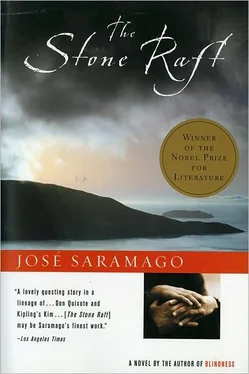José Saramago - The Stone Raft
Здесь есть возможность читать онлайн «José Saramago - The Stone Raft» весь текст электронной книги совершенно бесплатно (целиком полную версию без сокращений). В некоторых случаях можно слушать аудио, скачать через торрент в формате fb2 и присутствует краткое содержание. Год выпуска: 1996, ISBN: 1996, Издательство: Houghton Mifflin Harcourt, Жанр: Современная проза, на английском языке. Описание произведения, (предисловие) а так же отзывы посетителей доступны на портале библиотеки ЛибКат.
- Название:The Stone Raft
- Автор:
- Издательство:Houghton Mifflin Harcourt
- Жанр:
- Год:1996
- ISBN:9780156004015
- Рейтинг книги:5 / 5. Голосов: 1
-
Избранное:Добавить в избранное
- Отзывы:
-
Ваша оценка:
- 100
- 1
- 2
- 3
- 4
- 5
The Stone Raft: краткое содержание, описание и аннотация
Предлагаем к чтению аннотацию, описание, краткое содержание или предисловие (зависит от того, что написал сам автор книги «The Stone Raft»). Если вы не нашли необходимую информацию о книге — напишите в комментариях, мы постараемся отыскать её.
José Saramago was born in Portugal in 1922. He is the author of six novels, including Baltasar and Blimunda and The History of the Siege of Lisbon, Blindness, and All The Names. His backlist is available in Harvest editions.
The Stone Raft — читать онлайн бесплатно полную книгу (весь текст) целиком
Ниже представлен текст книги, разбитый по страницам. Система сохранения места последней прочитанной страницы, позволяет с удобством читать онлайн бесплатно книгу «The Stone Raft», без необходимости каждый раз заново искать на чём Вы остановились. Поставьте закладку, и сможете в любой момент перейти на страницу, на которой закончили чтение.
Интервал:
Закладка:
This night Constant dreamed that it went to unearth bones on the battlefield, it had already gathered one hundred and twenty-four skulls when the moon went down and the earth turned dark, then the dog went back to sleep. Two days later, some boys playing soldiers in the fields reported to the mayor that they had found a heap of skulls in a field of wheat, and no one ever discovered how they came to be there, all gathered into a pile. But the housewives of Villalar have nothing but good to say of those Portuguese and Spaniards who came with a wagon and have already left, For price and quality they were the most honest peddlers who had ever passed this way.
...
Overcome evil with good, the ancients used to say, and with good reason, at least they put their time to good use by judging facts that were then new in the light of facts that were already old. Nowadays we make the mistake of adopting a skeptical attitude toward the lessons of antiquity. The President of the United States of America promised that the peninsula would be welcome, and Canada, as we will see, was not pleased. As the Canadians point out, Unless the peninsula changes course, it is we who will be playing host and then we'll have two Newfoundlands here instead of one, little do the people on the peninsula know, poor devils, what awaits them, biting cold, frost, the only advantage for the Portuguese is that they will be close to supplies of that cod they're so fond of. They will lose their summers but have more to eat.
The spokesman at the White House hastened to explain that the President's speech had been prompted fundamentally by humanitarian considerations without aspiring to political supremacy, especially since the countries of the peninsula had not ceased to be sovereign and independent just because they had gone floating off over the waters, they will have to come to a halt one day and be like every other country, and then added, For our part, we solemnly guarantee that the traditional good-neighbor policy between the United States and Canada will not be affected by any eventuality, and as proof of America's desire to maintain friendly relations with the great Canadian nation, we propose setting up a bilateral committee to examine the various problems arising in the context of this dramatic transformation of the world's political and strategic physiognomy, which certainly constitutes a first step toward the birth of a new international community comprising the United States, Canada, and now the Iberian countries, who will be invited to participate as observers at this meeting since they are still not physically close enough for there to be any immediate prospect of specifying the eventual form of this integration.
Canada publicly expressed its satisfaction with this explanation but let it be known that it considered an early meeting to be inopportune, arguing that any terms proposed might well offend patriotic sensitivities within Portugal and Spain, and suggesting as an alternative a quadrilateral conference to examine what measures should be taken to deal with any violent opposition once the peninsula reached the Canadian coast. The United States agreed forthwith, and its leaders silently thanked God for having created the Azores, for if the peninsula had not veered northward but had moved consistently in a straight line after breaking away from Europe, the city of Lisbon would definitely have remained with its windows facing toward Atlantic City, and after much reflection they came to the conclusion that the more it veered north the better, just imagine what it would be like if Baltimore, Philadelphia, New York, Providence, and Boston were to be transformed into inland cities with the inevitable decline in the standard of living. There is no doubt that the President had been much too hasty when he made that initial statement. In a subsequent exchange of confidential diplomatic notes, followed by secret meetings of high-ranking officials, Canada and the United States agreed that the best solution would be to arrest the peninsula en route, if at all possible at a point sufficiently close for it to remain outside the European sphere of influence but sufficiently remote to avoid causing any immediate or indirect damage to Canadian and American interests, and meanwhile to set up a committee charged with amending their respective immigration laws so as to strengthen discretionary clauses and discourage the Spanish and Portuguese from thinking that they can enter the North American countries at will on the pretext that we are all close neighbors now.
The governments of Portugal and Spain protested at the discourtesy of these powers that thus presumed to dispose of their interests and destinies, the Portuguese government with greater vehemence in view of the oaths it swore as a government of national salvation. Thanks to initiatives on the part of the Spanish government, contact will be established between the two peninsular countries to draw up a joint plan for exploiting the new situation to the fullest, in Madrid it is feared that the Portuguese government will enter these negotiations with the tacit hope that sometime in the future it will derive special benefits from its greater proximity to the coasts of Canada and the United States, but that depends. And it is known, or believed to be known, that in certain Portuguese political circles there is a campaign in favor of a bilateral agreement, albeit of a nonofficial nature, with the region of Galicia, which evidently won't please the central powers in Spain at all, intolerant as they are of irredentism, however disguised. There are even some who cynically claim and spread the word that none of this would have happened if Portugal had been on the other side of the Pyrenees, or, better still, had clung to the Pyrenees when the rupture occurred. That would have been one way of ending once and for all this habit of reducing the peninsula to a single country, this problem of being Iberian, but the Spaniards are deceiving themselves, for the problem will persist, and we need say no more. The days before reaching the shores of the New World are counted, a plan of action is under way so that negotiations may get under way at the right moment, neither too soon nor too late, this, after all, is the golden rule of diplomacy.
Unaware of the political intrigues being played out behind the scenes, the peninsula continues sailing westward, so steadily and easily that the various observers, whether millionaires or scientists, have already withdrawn from the island of Corvo, where they had positioned themselves in the front rows, as it were, for the sight of the peninsula passing. The spectacle was breathtaking, suffice it to say that the extreme tip of the peninsula passed less than five hundred meters away from Corvo, with great seething of waters. It was like watching the climax of a Wagnerian opera or, better still, like being at sea in a tiny vessel and seeing the enormous hulk of an unloaded oil tanker passing a few meters away, with most of its keel out of the water, it was enough, in short, to strike terror into us and make us dizzy, to send us to our knees to beg a thousand pardons for our heresies and evil deeds and to exclaim, God exists. Such is the power of primitive nature over the spirit of man, however civilized.
But while the peninsula is playing its part in the movements of the universe, our travelers are already proceeding beyond Burgos, so successful with their trading that they have decided to put Deux Chevaux on the highway, which is unquestionably the fastest route. Farther ahead, after passing Gasteiz, they will return on to the roads that serve the smaller villages, there the wagon will be in its element, a cart drawn by horses on a country road rather than this unusual and startling exhibition of dawdling along a road designed for high speeds, this lazy trot at fifteen kilometers an hour, provided they are not going uphill and provided the animals are in a good mood. The Iberian world is so greatly altered that the traffic police who witness this do not order them to stop, they impose no fine, mounted on their powerful motorcycles they give them a nod to wish them a good journey, at most they ask about the red paint on the awning if they happen to be on the side where the patch is visible. The weather is good, there has been no rain for days, you would think summer had returned were it not for the autumnal wind that can sometimes be extremely cold, especially since we are so close to high mountains. When the women started complaining about the chill in the air, José Ana if o remarked, as if in passing, on the consequences of getting too close to high latitudes, telling them, if we end up in Newfoundland, our journey is finished, to live outdoors in that climate you have to be an Eskimo, but the women paid no attention, perhaps they weren't looking at the map.
Читать дальшеИнтервал:
Закладка:
Похожие книги на «The Stone Raft»
Представляем Вашему вниманию похожие книги на «The Stone Raft» списком для выбора. Мы отобрали схожую по названию и смыслу литературу в надежде предоставить читателям больше вариантов отыскать новые, интересные, ещё непрочитанные произведения.
Обсуждение, отзывы о книге «The Stone Raft» и просто собственные мнения читателей. Оставьте ваши комментарии, напишите, что Вы думаете о произведении, его смысле или главных героях. Укажите что конкретно понравилось, а что нет, и почему Вы так считаете.












